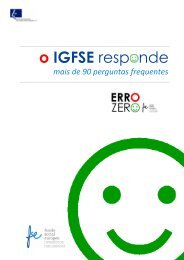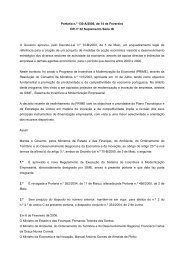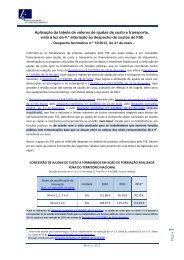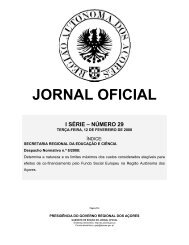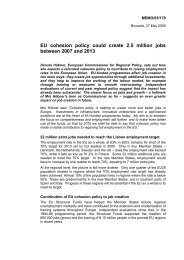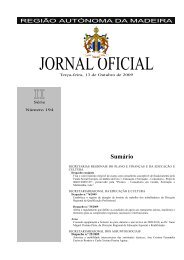Industrial Relations in Europe 2012 - European Commission - Europa
Industrial Relations in Europe 2012 - European Commission - Europa
Industrial Relations in Europe 2012 - European Commission - Europa
You also want an ePaper? Increase the reach of your titles
YUMPU automatically turns print PDFs into web optimized ePapers that Google loves.
Box 7.8 Conference on the <strong>Europe</strong>an Social Partners' Agreement<br />
The conference Negotiation, consultation and autonomy of EU Social Partners – 20 years of the<br />
Social Partners' Agreement celebrated two decades of <strong>Europe</strong>an social dialogue s<strong>in</strong>ce the <strong>Europe</strong>an<br />
Social Partners' Agreement of 1991. It reviewed the process which led to the <strong>in</strong>tegration of the<br />
Maastricht Social Protocol <strong>in</strong>to the Amsterdam Treaty (currently Arts 154 and 155 TFEU) and<br />
placed it <strong>in</strong> the current context. The aim of the conference was to assess the changes that have been<br />
brought about by <strong>Europe</strong>an Social Dialogue <strong>in</strong> EU primary and secondary law, how the consultation<br />
and negotiation process between EU social partners has evolved, and the concrete results of this, <strong>in</strong><br />
order to evaluate the current state of <strong>Europe</strong>an social dialogue. The event allowed an exchange of<br />
views among social partners, Member States and other participants on the way these provisions<br />
function and likely future developments.<br />
The aim was thus not only to commemorate past achievements, but also to look forward. It was not<br />
the purpose to take decisions with immediate effect but rather to <strong>in</strong>troduce, test and debate ideas for<br />
the way forward.<br />
The conference was organised <strong>in</strong> Warsaw on 24-25 November 2011 <strong>in</strong> cooperation with the Polish<br />
Presidency – which was represented by the M<strong>in</strong>ister and Deputy M<strong>in</strong>ister for Employment and<br />
Social Affairs – and brought together high-level representatives of the cross-<strong>in</strong>dustry and sectoral<br />
social partners at <strong>Europe</strong>an and national level, as well as representatives of Member States, EU<br />
<strong>in</strong>stitutions – <strong>in</strong>clud<strong>in</strong>g <strong>Commission</strong>er Andor– and academics.<br />
In the different sessions of the conference, several examples of outcomes of <strong>Europe</strong>an social<br />
dialogue, both at cross-<strong>in</strong>dustry and sector level, were presented. These presentations, as well as the<br />
panel discussions and exchanges with participants, provided <strong>in</strong>sights <strong>in</strong>to the challenges that the<br />
<strong>Europe</strong>an social dialogue is fac<strong>in</strong>g as well as <strong>in</strong> the jo<strong>in</strong>t and divergent views of the two sides of<br />
<strong>in</strong>dustry.<br />
Both sides strongly emphasised the importance of respect<strong>in</strong>g the autonomy of the social partners,<br />
both as regards fix<strong>in</strong>g their agenda for discussion and – where appropriate – the negotiation and<br />
implementation of their agreements. They agreed that care should be given to the choice of the<br />
appropriate type of <strong>in</strong>strument, depend<strong>in</strong>g on the objective pursued.<br />
The importance of tak<strong>in</strong>g ownership for social dialogue outcomes was emphasised. This does not<br />
only concern autonomous agreements, but also agreements implemented by EU Directive, where<br />
the social partners should also take responsibility for promot<strong>in</strong>g and implement<strong>in</strong>g the agreement at<br />
national level. The Directive on sharps <strong>in</strong>juries <strong>in</strong> the hospital sector was mentioned as a positive<br />
example of this cont<strong>in</strong>ued engagement of the social partners.<br />
This ownership also <strong>in</strong>cludes a will<strong>in</strong>gness to regularly assess exist<strong>in</strong>g agreements and, if necessary,<br />
to revise them. Trade unions <strong>in</strong> particular voiced concerns about the quality of implementation of<br />
<strong>Europe</strong>an social partner agreements at national level, <strong>in</strong> particular the autonomous agreements that<br />
are implemented “<strong>in</strong> accordance with the procedures and practices specific to management and<br />
labour and the Member States”. The impression is that there is a trend to consider the autonomous<br />
agreements as allow<strong>in</strong>g for an optional implementation. Both sides nevertheless confirmed their<br />
299



